 Petzlover
Petzlover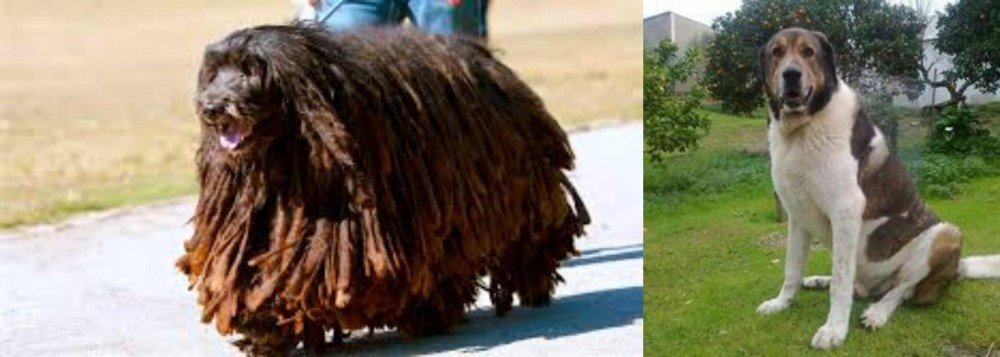 Bergamasco is originated from Italy but Cao de Gado Transmontano is originated from Portugal. Bergamasco may grow 21 cm / 8 inches shorter than Cao de Gado Transmontano. Bergamasco may weigh 27 kg / 59 pounds lesser than Cao de Gado Transmontano. Bergamasco may live 3 years more than Cao de Gado Transmontano. Both Bergamasco and Cao de Gado Transmontano has almost same litter size. Bergamasco requires Moderate Maintenance. But Cao de Gado Transmontano requires Low Maintenance
Bergamasco is originated from Italy but Cao de Gado Transmontano is originated from Portugal. Bergamasco may grow 21 cm / 8 inches shorter than Cao de Gado Transmontano. Bergamasco may weigh 27 kg / 59 pounds lesser than Cao de Gado Transmontano. Bergamasco may live 3 years more than Cao de Gado Transmontano. Both Bergamasco and Cao de Gado Transmontano has almost same litter size. Bergamasco requires Moderate Maintenance. But Cao de Gado Transmontano requires Low Maintenance
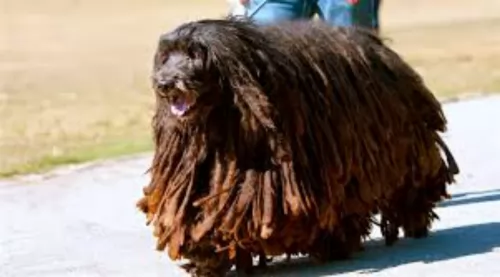 The Bergamasco comes from northern Italy. This medium sized sheepdog is of ancient origin. Known as an Italian sheep herding breed, his name actually comes from the town where he comes from - Bergamo.
The Bergamasco comes from northern Italy. This medium sized sheepdog is of ancient origin. Known as an Italian sheep herding breed, his name actually comes from the town where he comes from - Bergamo.
It was after World War II that there was danger that this breed would disappear as the need for herding and shepherding was diminishing. An Italian breeder, however, Dr. Maria Andreoli, stepped in to save the breed.
It was in 2015 that the American Kennel Club also changed the breed’s status from Miscellaneous to the Herding Group.
 The Cão de Gado Transmontano which is also known as the Transmontano Mastiff or Transmontano Cattle Dog is a large dog – in fact a giant dog breed. This is a rare molosser working dog, hailing from the region of Tras-os-Montes e Alto Douro Province in Portugal.
The Cão de Gado Transmontano which is also known as the Transmontano Mastiff or Transmontano Cattle Dog is a large dog – in fact a giant dog breed. This is a rare molosser working dog, hailing from the region of Tras-os-Montes e Alto Douro Province in Portugal.
The large dog has always been used to herd livestock and to also ward off wolves. It is believed that the dog’s roots come from the Tibetan Mastiff as well as a Portuguese cattle dog known as the Rafeiro do Alentejo. The dog also shares some similarities with the short-haired Estrela Mountain Dog.
In 1995 the breed was still exclusive to Portugal, but now the breed has been imported to Oregon, USA to be part of an experiment to document bigger breeds and their role in protecting livestock from wolves. They were re-introduced to north-east Oregon from 2008.
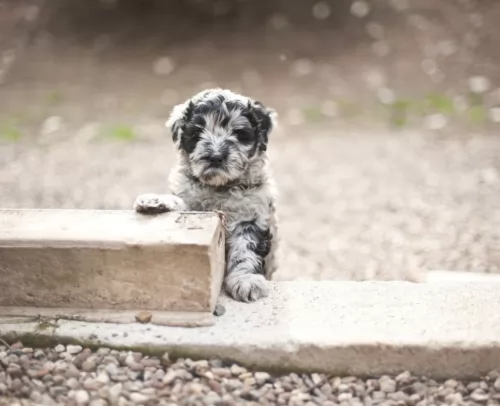 This medium sized sheepdog stands 54 – 62cm in height and weighs up to 38 kg as an adult. It is his coat which draws the most attention. It is of a coarse texture and actually greasy to the touch. It actually forms into strands or almost like dreadlocks from the top of the body, so that people agree he is one of shaggiest dog breeds there are.
This medium sized sheepdog stands 54 – 62cm in height and weighs up to 38 kg as an adult. It is his coat which draws the most attention. It is of a coarse texture and actually greasy to the touch. It actually forms into strands or almost like dreadlocks from the top of the body, so that people agree he is one of shaggiest dog breeds there are.
From age 1 on the coat starts to become woolly, and then the flocks start to form. As these clumps of hair appear, it will become necessary to separate them into smaller cords by hand to ensure attractive formation Brushing isn’t necessary but a big toothed comb can keep their hair ‘groomed’.
The colour of the coat is solid grey with patches of shades of grey and sometimes black. His dense, heavy coat makes it that he is suited to cooler climates. Because he is a herding dog, he wouldn’t do well in an apartment but would suit a home with a large garden.
He is intelligent and social but will need firm handling as he is a boisterous dog. He has a muscular yet compact body with a large head, long tail, high-set semi-drooping ears and large, gentle looking brown eyes. Although not instinctively aggressive, he makes an excellent watch dog with strong protective instincts to protect his human family.
He views new people into his circle with suspicion and wariness. He is good with kids and pets in the home and is playful and energetic.
 The Cão de Gado Transmontano is a large dog, believed to be the biggest of the Portuguese dog breeds. He is powerful and muscular with a large head and can stand up to 83cm in height and can weigh up to 65kg.
The Cão de Gado Transmontano is a large dog, believed to be the biggest of the Portuguese dog breeds. He is powerful and muscular with a large head and can stand up to 83cm in height and can weigh up to 65kg.
He is tough, and is quite comfortable living outside. He is a long-legged dog with a wide chest with medium length floppy ears and a long tail. The coat is fairly short although it can be in a variety of lengths. It is the medium length coated dog with the right coloring that is looked upon as a pure breed. The dog is white with large patches of brown, fawn, grey, brindle and black shades.
The Transmontano Mastiff is an intelligent, obedient dog who is also independent and stubborn. As with all dogs, it is important to have him trained and socialized as this makes him obedient and eager to please. He loves to be patted by his owners and is a dog which is easy to train, responding well to firmness and fairness.
He is calm and somewhat docile but at the same time he is energetic and alert, making him a good watchdog. He won’t do well cooped up in a tiny space. He gets on well with children and other pets in the home.
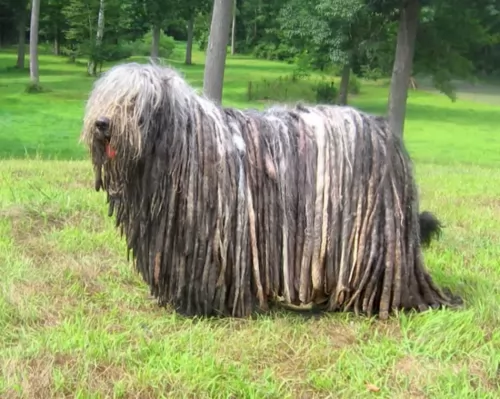 This is a working dog so they are naturally alert. He is also intelligent and independent and this independence is seen with training as he doesn’t take easily to following instructions, becoming stubborn. You’ll certainly want to have your Bergamasco socialized and trained as he can be a boisterous dog, bounding with energy.
This is a working dog so they are naturally alert. He is also intelligent and independent and this independence is seen with training as he doesn’t take easily to following instructions, becoming stubborn. You’ll certainly want to have your Bergamasco socialized and trained as he can be a boisterous dog, bounding with energy.
This is a dog that will need to be kept busy and provided with plenty of activities so that he remains happy, playful and relaxed.
Lively and intelligent, these dogs also form strong bonds with their owners and get on well with the children in the home. He will take well to country life as opposed to living in the city.
 The Cão de Gado Transmontano may look like a fairly formidable dog but they aren’t aggressive. They are full of courage and are above all, loving and loyal to their human family.
The Cão de Gado Transmontano may look like a fairly formidable dog but they aren’t aggressive. They are full of courage and are above all, loving and loyal to their human family.
When you choose to have one of these large dogs as your pet, it is important to make sure he knows that you’re the leader. With training and socialization this dog is a gentle giant who makes an exceptional family pet.
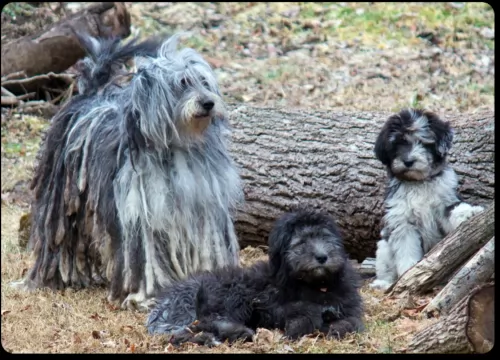 Your Bergamasco can live to be 13 to 15 years of age and he is considered to be a healthy breed. Nonetheless you want to be aware of health issues that are common to this breed
Your Bergamasco can live to be 13 to 15 years of age and he is considered to be a healthy breed. Nonetheless you want to be aware of health issues that are common to this breed
he is vulnerable to heat. He can die of heat exhaustion quicker than other breeds
keep an eye on him for hip dysplasia, progressive retinal atrophy and skin allergies
 The Cão de Gado Transmontano is a tough dog, used to spending long hours outside guarding sheep. These days however, he is also a companion dog and you’ll want to be aware of some common dog ailments that can strip him of his health and his joy of life.
The Cão de Gado Transmontano is a tough dog, used to spending long hours outside guarding sheep. These days however, he is also a companion dog and you’ll want to be aware of some common dog ailments that can strip him of his health and his joy of life.
Hip Dysplasia is a looseness with the hip joint, and while it can occur with all dogs, it is more common in large dogs. It’s a disease which can lead to arthritis, pain and also joint degeneration. It’s a disease which can be debilitating for the dog and you will need to get your dog to the vet.
This is a heart disease seen in large breed dogs and where the heart becomes weak and can’t properly pump blood throughout the body. Symptoms include coughing, weakness, difficulty with breathing as well as a fluid-distended abdomen.
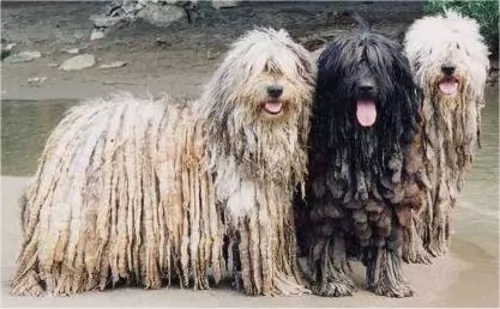 The Bergamasco isn’t a shedder but his coat will need to be combed once a week just to keep it in order. You don’t want to bath him too often, especially during the Winter as his coat takes a long time to dry. It isn’t recommended to shave a Bergamasco as the coat regulates the dogs temperature – keeping him warm and cold as the weather demands.
The Bergamasco isn’t a shedder but his coat will need to be combed once a week just to keep it in order. You don’t want to bath him too often, especially during the Winter as his coat takes a long time to dry. It isn’t recommended to shave a Bergamasco as the coat regulates the dogs temperature – keeping him warm and cold as the weather demands.
They thrive on a blend of kibble (dry) mixed with raw and-or moist food once or twice a day. Remember to include quality chicken, turkey, etc. mixed with some vegetables and rice into your dog’s diet. Ensure a constant supply of fresh water in an easily-cleanable bowl.
Balls and ropes are important for building muscle strength and burning energy. Remember your Bergamasco is a working breed and will need plenty of games and exercise.
 Just because this is a large dog, doesn’t mean you need to over-feed him. He is muscular and athletic, and by watching his diet, he’ll continue to be strong, lean and healthy. You can feed him a top quality pet-food brand and include boiled chicken, rice and vegetables. Every now and then mix in some raw meat with his dog food to ensure that his skin remains free of rashes and itchiness. Fresh, cool water must be available to him day and night as he drinks abundantly.
Just because this is a large dog, doesn’t mean you need to over-feed him. He is muscular and athletic, and by watching his diet, he’ll continue to be strong, lean and healthy. You can feed him a top quality pet-food brand and include boiled chicken, rice and vegetables. Every now and then mix in some raw meat with his dog food to ensure that his skin remains free of rashes and itchiness. Fresh, cool water must be available to him day and night as he drinks abundantly.
Some dog breeds need to be trimmed or stripped to look good, and dog owners often invest in expensive equipment to groom their pets themselves, Fortunately the large Cão de Gado Transmontano is a low maintenance dog and all you’ll need to do is give him a good brush-down twice a week.
Check his eyes, ears, teeth and nails regularly. Remember that dental hygiene is imperative and special canine toothbrush and toothpaste is available to brush your dog’s teeth 2 or 3x a week to get rid of plaque and to prevent gum disease and tooth decay.